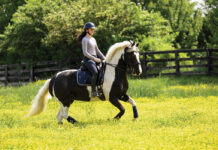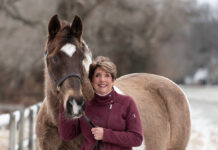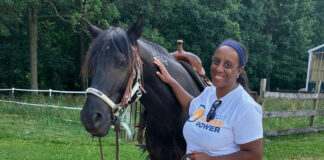Riders often cite fun and relaxation among the reasons they ride horses, and on the good days, there is no better way to unwind than time in the saddle. However, there is always an element of danger in equestrian sports, and just about every rider experiences nervousness or fear at some point.
Trust Your Partner
“Having struggled with fear issues for the past four years, I feel compelled to share my journey,” writes Deborah Collins.
“Getting older is my biggest issue,” says Deborah. “When I was younger, my fear level was zero. I was the girl that would do back flips off the high dive, climb 100-foot trees, ride horses, four wheelers, et cetera, without a care in the world. My general demeanor was always calm and confident, given any situation.”

Photo courtesy Deborah Collins
The change in mentality that Deborah experienced later in life came as an unpleasant surprise, one that many equestrians of a certain age will recognized.
“Approaching my fifties, something physiological took place deep inside me,” she continues. “Suddenly, I had anxiety for no reason, to the point where I had my doctor run blood tests to rule out any underlying health issues. Everything came back in normal range. Anxiety is a creeper. It strikes when least expected, usually for no apparent reason. When it comes time to ride horses, my anxiety rears up and takes a nasty grip on my confidence. Once I get past it, the joy and comfort in riding returns and eventually fades any fear and anxiety. But it is a battle I would rather not have to deal with at all. Why can’t I just ride a horse and enjoy every second, the way it used to be?
“The obvious answer to this problem would be a bombproof horse,” says Deborah. “My first horse, who I owned when I was in my 30s, was as close to bombproof as they come. We had that magical connection that happens when it seems like we can read each other’s thoughts and have complete trust in each other. But he was an older gelding and eventually, his time had come. Then we moved and did not own horses for two years. Finally, after moving back to the country, we knew that we wanted to get back into horses right away.”
Deborah’s husband quickly found his equine match in a beautiful, long-strided Tennessee Walking Horse. Meanwhile, Deboarah continued taking riding lessons and working on her natural horsemanship skills in an effort to boost her confidence, but it was a rocky road.
“I went through four Walking Horses, all great horses, but not for me. Usually my confidence issues would find a way of unfurling our human/horse relationship and I would find the horse a more suitable owner before starting all over again.
“After strike four with the Walking Horses, I had decided that a laid-back Quarter Horse might be more suited for me and my companion, Mr. Anxiety,” says Deborah. “In December 2014, I found Scooby, an unregistered QH/Morgan cross with a calm and lazy demeanor. Perfect! The following year, we had enjoyed several trail rides and our bond was getting closer. Only problem was [that Scooby’s previous owner] had taught him how to jump which apparently he enjoyed. So, what’s the problem? I don’t know how to jump.”
Deborah explains that Scooby’s desire to jump over every creek and ditch on the trail and her efforts to make him walk quietly across led to some wild moments.
“After a getting bucked a few times, I was scared to get back on, yet I knew the problem stemmed from my riding,” Deborah explains. “Fortunately, we know a few horse trainers (they really should be called people trainers). Our friend, Dan, was kind enough to come to our place and he worked with Scooby and me, crossing water and ditches comfortably. My next trail ride, rather than trying to hold him back at crossings, I let him have his head. There was no bucking but he took me for a heck of a ride. I had to learn to ride those jumps, one way or another.”
Other trail riders suggested Deborah get rid of Scooby in favor of a quieter mount, but that no longer seemed like an option.

Photo courtesy Deborah Collins
“Strangely enough, in spite of our riding dilemmas, there was a bond forming, similar to the one I had had with my old trusty gelding,” says Deborah. “We went on another trail ride and things got better. Thankfully, we seem to have gotten past the bucking problem. After enough rides together, he has made me a better rider and he is starting to trust me over the ditches, which he is now taking his time over, rather than trying to cross in a single bound. We are working together and helping each other. There are plenty of times that I get on and still feel that slightly jittery feeling in my legs. He seems to sense it and lowers his head, letting out a big sigh, sending that sweet lower lip fluttering. He lets me know everything is going to be ok and we ride on!
“I believe for someone like me, who has recurring anxiety, it is important to have an emotional bond with your horse, a sense of trust between horse and rider,” Deborah concludes. “That’s what helps me to overcome any obstacle we may face.”
A Support Group
While many lifelong equestrians start out with youthful confidence, fear certainly isn’t exclusive to older riders. Young rider Victoria Amott describes her struggles with nerves as she learned to ride.
“I’ve been riding [for five years],” writes Victoria. “I now work at my local stables as a Saturday job, and nothing suits me better!”
Victoria learned to ride in group lessons, and the relatively short amount of time in the saddle she got each week made for slow progress.
“It took me probably about 2 years to even begin to feel remotely confident in the canter,” says Victoria. “Even then I would only do it on horses I knew were lazy and wouldn’t bolt with me! I remember having to turn into the middle and attempt to control the panic attacks I used to have and honestly, I still get nervous on horses I’ve never ridden.”

Guinness, one of the horses in Victoria’s lesson program. Photo courtesy Victoria Amott
Being in group lessons turned out to be helpful for Victoria as she worked through her anxiety.
“The thing that got me through it was the great support system of instructors that we have at my stable yard,” she says. “These are the type of people that sympathize but won’t let you give up just because you panic. I now ride the more tricky horses…and honestly I think its great. Getting through that difficult time not only improved my riding skills, but I believe made me a stronger character on the ground. I can still be a nervous rider at times, still struggling to get over my panic when the instructor puts the one-foot jump half an inch higher, but after getting through my fear of speed, jumping’s just the next obstacle!”
One Step at a Time
“I started taking lessons at age sixty and was generally terrified when the horse twitched, raised its head, shied, speeded up when trotting, and of course cantering,” writes Helene Gardel. “I wanted to be a cowgirl, galloping across a field, and I barely feel safe enough in the ring. Learning to canter took years, partly because my bones hurt so much with each bounce.”
But Helene’s love of horses and riding and her desire to keep learning carried her through the rough patches. She has attended clinics with Clinton Anderson, Pat Parelli and Buck Branaman as well as learning from her barn family.
“I feel much less afraid the more I do,” she says. Today, she canters and even jumps crossrails.
“I am riding two or four times a week, I participate in a horseshow circuit for any age rider and I feel every minute on the horse is part of a lesson,” Helene continues. “My riding teacher said you need a thousand hours in the saddle. I believe it.”

Photo courtesy Helene Gardel
“Developing a small amount of confidence from increasing skills and not comparing myself to the other riders in my lessons helps,” adds Helene. “I still have fears of higher jumps, horses that trot or canter forward (which feels fast to me), things that make horses shy…”
Helene admits that riding still isn’t always easy. Falls happen. The love of horses and desire to improve as a rider often conflicts with the fear that comes with the sport.
“I get back on, I debate quitting, I wonder at almost seventy and still being a beginner, how smart is this?” Helene says. “I just had a right total knee replacement and I’m riding and showing six months later. I’m afraid. I’m tenacious to learn to do this. I want to feel safe and be a partner with my horses. I guess I overcome some fears and new ones emerge!”
Even with the mixed feelings around riding, Helene stays positive.
“My secret is: great teachers, incredibly tolerant horses and a love of the animal,” she says. “No horse has hurt me on purpose. I just want to get more skills so maybe I can relax and know I am having fun.”
Life Lessons
Getting through a horse-related fear can translate to overcoming fears in other parts of your life. That’s what Sandy Lentz-Hack found out when she started competing with her horse.
“My greatest fear and obstacle was being alone in front of people that are watching me,” Sandy explains. “Situations like standing up in class to do an oral report, jobs that might require me to talk to people in groups or one-on-one, et cetera always terrified me.
“I got my first horse at 13,” continues Sandy. “At 16, and after my barn friends coaxed me into it, I started competing in gymkhana and barrel racing. I was so scared to enter the arena. Petrified really. Thanks to my wonderful AQHA mare, Miss Chula Watie (“Chewy”), for navigating the patterns flawlessly while I freaked out. It took me some time to actually “enjoy” the ride; let alone hear people cheering for me.”
But over time, Sandy’s confident horse helped her gain her own confidence competing in front of spectators, and that led to more confidence in other venues.

Photo courtesy Sandy Lentz-Hack
“That was the beginning for me,” says Sandy. “After my childhood fears began to dissipate, I found I could speak with groups easier, do those dreaded oral reports in college, and even do karaoke or act silly in front of people.”
“Being part of a team with a horse made all the difference in the world,” she continues. “When I grew up and was faced with those uncomfortable, frightening experiences, I was no longer afraid. Horses brought me out of my shell and I am forever grateful to them all.”
For more on overcoming nerves, see Face Your Fears in the June 2016 issue of Horse Illustrated. Click here to subscribe!
Leslie Potter is Managing Editor of horseillustrated.com. Follow her on Twitter: @LeslieInLex.






great info
Story many can relate to.
Great article!! I am actually just starting to ride again at 29 after an almost 15 year hiatus. I am nervous all around but excited to get back to riding!!